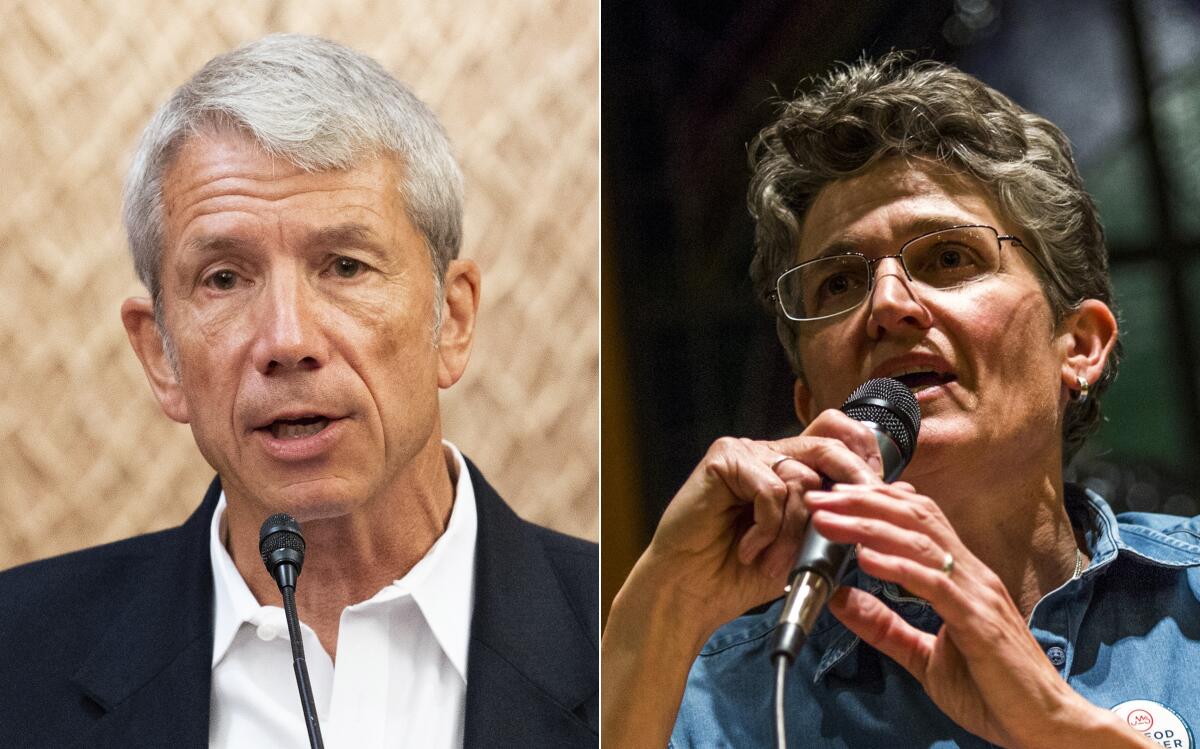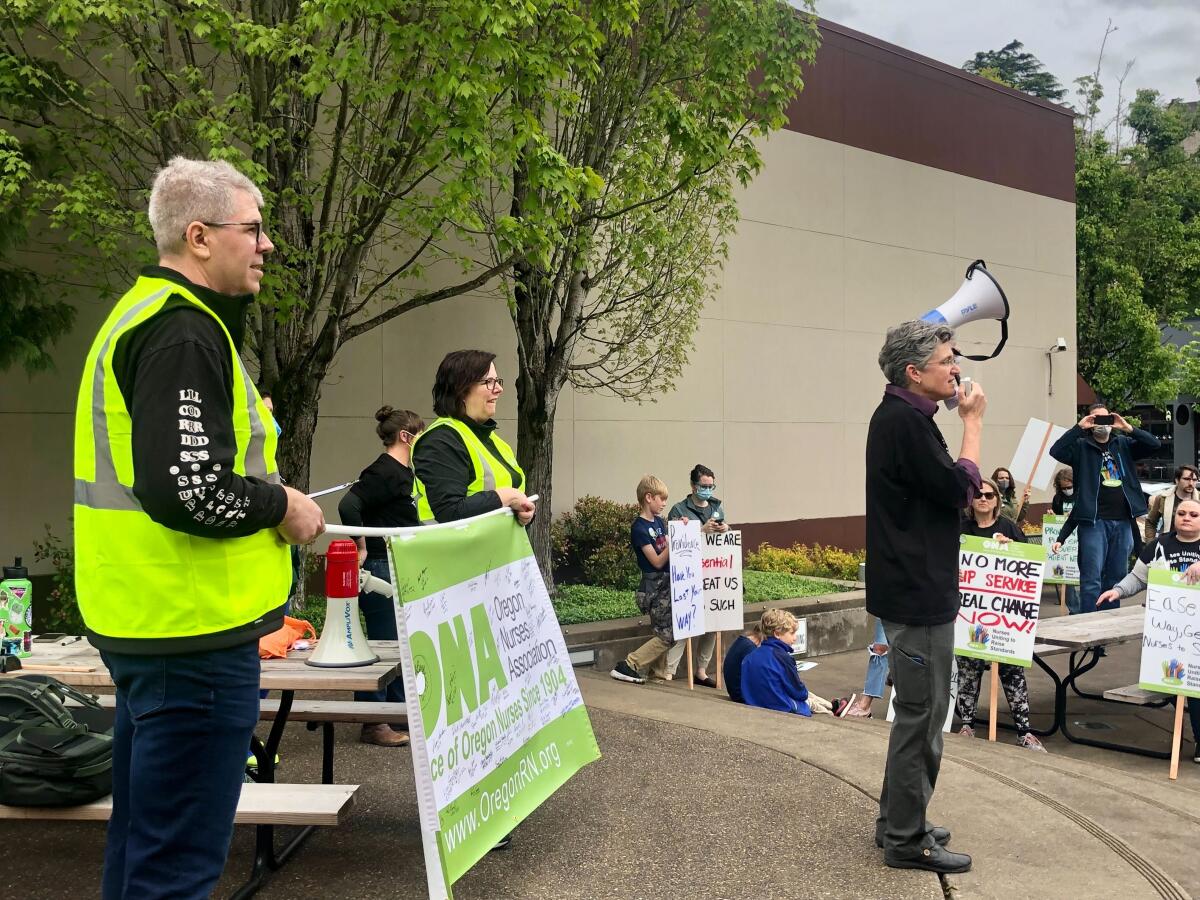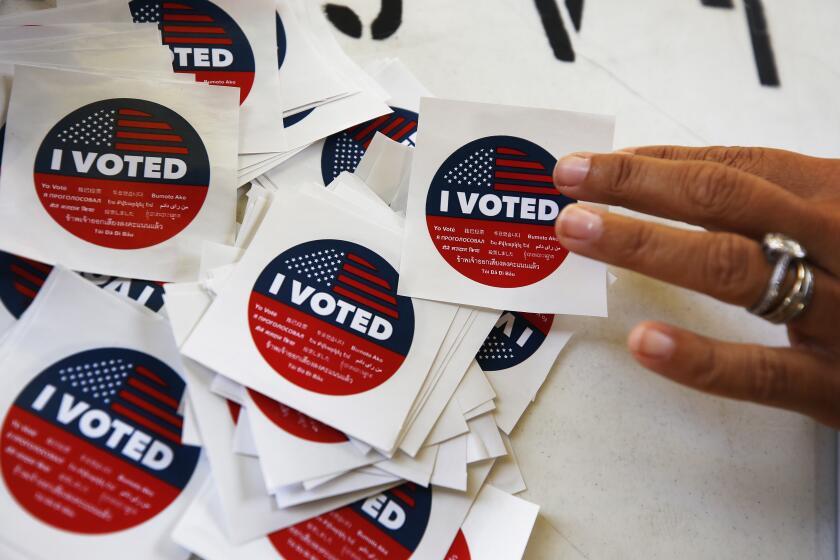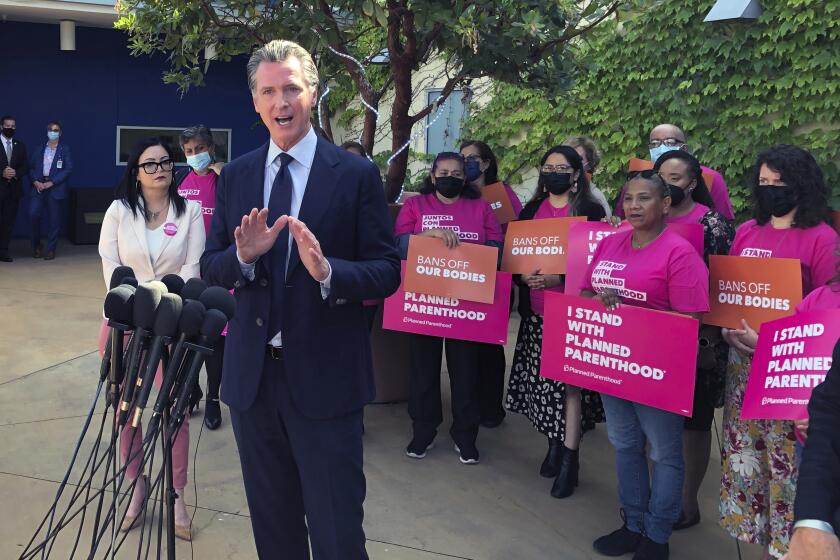Column: Fight or find common ground? Oregon race a referendum on the direction of Democrats

- Share via
WEST LINN, Ore. — Kurt Schrader, a seven-term congressman from central Oregon, has belittled Nancy Pelosi, defended Donald Trump and voted against many of the Democratic Party’s top priorities.
Still, he insists he is “a solid Democrat” and the very sort who can not only help the party retain its thin-ice majority in the House in November but also end the partisan warfare that has gripped Congress for the past many years.
Ira Erbs, though, is having none of it.
“Schrader is a corporate Dem,” said Erbs, a political strategist for the state teachers union. “He’s in it for his own self-aggrandizement. His whole schtick about being bipartisan just makes him a DINO. He’s a Democrat in name only.”
Much of the focus this election season has been on the political right and, in particular, the degree of Republican fealty to former President Trump.
Soon Democrats will decide a series of primary contests — in Oregon, Pennsylvania, Texas and elsewhere — that will gauge not just the strength of the political left but also what little remains of the vanishing center in Congress.
After a series of elections in which beating Trump was the epoxy holding Democrats together, the party has splintered along familiar lines, between those saying it needs to appeal more to the middle and others arguing Democratic success lies in rallying the liberal base.
That fight over strategy and direction will have one of its first tests Tuesday, when Schrader faces a stiff challenge from Jamie McLeod-Skinner, an attorney and emergency-response expert running as a progressive alternative to the party-bucking incumbent — or, as she describes it, as a real Democrat.
California’s 2022 primary election ballot includes races for governor, attorney general, the Legislature and Congress, as well as local contests.
“His definition of being a moderate is really falling short of what people need right now,” McLeod-Skinner said in a recent conversation after joining nurses seeking higher wages in a boisterous march — cowbells clanging, motorists honking horns — along the Willamette River outside Portland. “And that’s why so many folks say he’s out of touch.”
Schrader counters that McLeod-Skinner, who has the support of Massachusetts Sen. Elizabeth Warren and other forces on the left, is the one who misapprehends the moment.
“People want someone to represent the district, not an ideology,” he said in the candidates’ sole debate. “We need to stop the bickering and get work done, like I’ve done.”
It’s unusual for a House member to face an opponent as serious as McLeod-Skinner, and rarer still for one to lose a primary.
But the angry mood of many Democrats has made Schrader’s talk of bipartisan cooperation a much tougher sell. In an unusual move, four of the five county Democratic parties in the district have endorsed McLeod-Skinner, changing their rules to do so.
“Oregon’s Joe Manchin,” was how Jennifer Trask, a Democrat from the Portland suburb of Milwaukie, described Schrader, referring to the West Virginia senator who has helped tank major parts of President Biden’s agenda. “Republicans don’t even need to run their own candidate.”
A former state lawmaker and veterinarian by trade, the 70-year-old congressman portrays himself as a pragmatist who refuses to let party loyalty stand in the way of practicality.
He opposed Pelosi’s ascension to the speakership because, Schrader said, Democrats need fresh leadership. He voted against a measure to cap drug prices because he saw it going nowhere in the Senate and was among those forcing Biden to split his infrastructure bill in two — separating roads and bridges from social spending and climate change — because, he argued, it was the only way to get anything passed.
Schrader did apologize after calling the second impeachment of Trump, following the Jan. 6 insurrection, a lynching. “My words were wrong, hurtful and completely inappropriate,” he said. Schrader ended up voting to impeach the president.
Otherwise he expresses no qualms.
When McLeod-Skinner assailed him during their debate for voraciously fundraising from special interests — including accepting hundreds of thousands of dollars from the pharmaceutical industry — Schrader coolly replied that he supported campaign finance reform but would not cede ground to Republicans collecting big sums to win the seat in November. (The district, newly drawn after the last census, leans Democratic but not overwhelmingly.)
Rosie Stephens, a former chair of the Democratic Party in Clackamas County, just outside Portland, said Schrader has upset her on more than one occasion. “But there’s no perfect candidate,” she said, explaining why she supports his reelection.
Democrats “would do a lot better and win a lot more elections if we focused more toward the center,” Stephens added.
Schrader also has the endorsement of Biden, who acknowledged the two “don’t always agree.” But, the president said, “when it mattered most, Kurt has been there for me.”

For her part, McLeod-Skinner said her opponent is too willing to capitulate to Republicans and too beholden to his financial backers, caving in rather than fighting for the voters he’s supposed to represent.
“We had the opportunity last year to move forward some really important legislation that would help to address the crises that people are experiencing,” she said. “And he got in the way of that.”
McLeod-Skinner also claims Schrader has lost touch. Although Schrader owns a farm in Clackamas County, McLeod-Skinner scoffed at a campaign mailer showing the lawmaker outside a red barn bucking hay barehanded.
“I’ve shaken your hand. You have very soft hands,” she said during a joint appearance before the Willamette Week editorial board, which turned to discussion of the weight of hay bales and the technique for wrangling them. “People in central Oregon are laughing at those photos.”
McLeod-Skinner, 54, lives on a ranch near the southern end of the district, which extends from the forested outskirts of Portland through rural stretches to the outdoorsy meccas of Bend and Sunriver. Though she lives just outside the district, which the law allows, McLeod-Skinner has a political base in the Bend area from two previous campaigns, a 2018 congressional bid and 2020 run for secretary of state.
More than half the voters are new to Schrader, and vice versa, taking away some of the advantage he might otherwise enjoy.
His scathing indictment of fellow Democrats on abortion raises eyebrows -- and his national profile
In the chilly backroom of a brewery in West Linn, a Portland suburb, McLeod-Skinner gathered last week with about 30 supporters.
As they grazed on nachos and other pub food, she made her pitch: about fighting for a higher minimum wage, lower drug costs and all the things, she said, Schrader could have done but didn’t to help families, essential workers and others struggling through the pandemic. She passed out a color-coded sheet, “Jamie vs. Kurt” — though it was clearly an audience that didn’t need convincing.
From the rear, Erbs, the teachers union strategist, hollered his thanks to the candidate for running. Erbs voted for Biden in 2020, though he preferred Vermont Sen. Bernie Sanders for president, and said he often found himself casting a ballot for a less-bad Democrat just to keep a Republican from winning.
It was a pleasure, Erbs said, “to vote for someone for a change as opposed to against someone else.”
McLeod-Skinner beamed as the crowd cheered long and hard.
More to Read
Get the latest from Mark Z. Barabak
Focusing on politics out West, from the Golden Gate to the U.S. Capitol.
You may occasionally receive promotional content from the Los Angeles Times.













